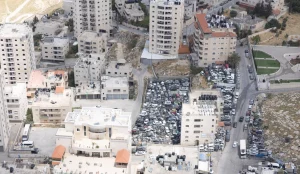Just 5 Percent of E. Jerusalem Palestinians Have Received Israeli Citizenship Since 1967

A bird’s eye view of an East Jerusalem neighborhood.
Only 5 percent of Palestinian residents of East Jerusalem – 18,982 people – have obtained Israeli citizenship since the city was reunified in 1967.
The figure comes from a response by Interior Minister Ayelet Shaked to a parliamentary inquiry from MK Mossi Raz of Meretz.

Only 34 percent of naturalization applications submitted by Palestinians living in East Jerusalem are approved, and in many cases final approval takes years.
The response disclosed for the first time the complete data regarding the naturalization of this group, citizenship by Palestinians living in Jerusalem, showing that in most years the numbers were negligible.
In the first years after reunification following Israel’s capture of East Jerusalem in the Six-Day War, from 1970-74, hundreds of people obtained citizenship each year. The numbers dropped sharply in 1975-2004, with at most a few dozen East Jerusalem Palestinians completing the process each year. A slight rise in applications began in 2005 and peaked in 2019, when 2,372 Palestinians from East Jerusalem became Israeli citizens. This was followed by a decline, with only 1,304 naturalized citizens in 2021 and just 219 in the year to date.

Amnon Ramon of the Jerusalem Institute for Policy Research studies the legal status of East Jerusalem residents. He attributes the rise in the 1970s to lax Israeli policy after the 1967 war and says that most of the East Jerusalem Palestinians who obtained Israeli citizenship were city employees, police officers, businessmen and collaborators with the Israeli authorities. In subsequent years, applying for citizenship became taboo in Palestinian society, perceived as an acceptance of the occupation and as collaboration.
Ramon explains that the change that’s occurred over the last 17 years derives from the deep changes taking place in the city’s Palestinian society. The barrier separating them from residents of the West Bank as well as changes in the education and employment markets have driven many residents to reconsider applying for Israeli citizenship. The social taboo on this has also eroded. It is no longer considered an act that detracts from one’s Palestinian nationality.
- Mapping Out the Rapid Judaization of East Jerusalem
- The East Jerusalem Palestinian Who Became Israel’s Chief Scientist
- The East Jerusalem Flashpoint That Could Ignite the Entire Middle East
However, the Interior Ministry’s Population and Immigration Authority has made the process more difficult. Over the past 20 years, only 38 percent of the 16,573 applications have been approved. The main reason cited for denial was failure to prove that Jerusalem was their primary place of residence and employment. Additional reasons include the lack of Hebrew language skills, refusal to renounce Jordanian citizenship, criminal background or security impediments.
The stringent policy is expressed in the number of Israeli citizens among Palestinians living in East Jerusalem. Fifty-five years after the city was unified, Palestinians account for 39 percent of the population but fewer than 5 percent of them are Israeli citizens.
